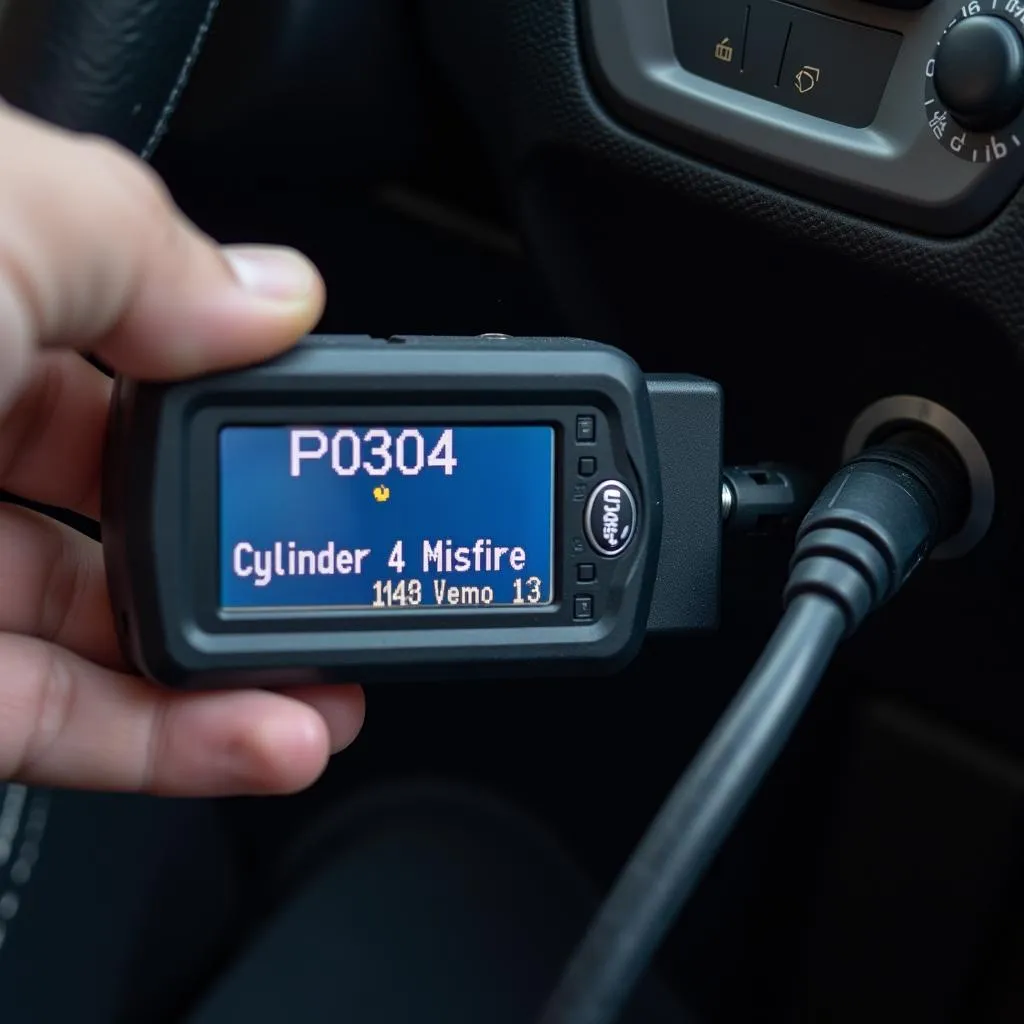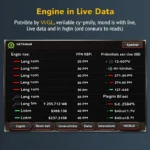A flashing check engine light and your Ford suddenly running rough? That’s never a pleasant experience. If you connect your OBD2 scanner and see the code P0304 staring back at you, it means you’re dealing with a cylinder 4 misfire. Don’t panic – while a misfire can be concerning, understanding what causes it and how to address it can save you time, money, and unnecessary headaches.
What Does P0304 Mean on a Ford?
In simple terms, a P0304 code on your Ford OBD2 scanner indicates that cylinder number 4 is experiencing a misfire. This means that the air-fuel mixture in that specific cylinder is not igniting properly, disrupting your engine’s normal combustion cycle.
Ignoring this problem can lead to more serious engine damage and costly repairs down the road.
Common Causes of a P0304 Code in Ford Vehicles
A P0304 code can stem from a variety of issues, often related to components essential for combustion:
- Faulty Spark Plugs or Wires: Worn-out spark plugs or damaged spark plug wires can prevent the spark needed to ignite the air-fuel mixture in cylinder 4.
- Clogged or Defective Fuel Injector: If the fuel injector for cylinder 4 is clogged or malfunctioning, it won’t deliver the right amount of fuel for proper combustion.
- Vacuum Leaks: Leaks in the intake manifold or vacuum hoses can disrupt the air-fuel ratio, leading to misfires.
- Compression Issues: Low compression in cylinder 4, potentially caused by worn piston rings or a damaged valve, can also lead to a P0304 code.
- Ignition Coil Problems: A failing ignition coil can weaken the spark to the spark plug, resulting in incomplete combustion.
Troubleshooting a P0304 Code
While it might be tempting to head straight to a mechanic, there are a few things you can check yourself:
- Inspect the Spark Plugs and Wires: Look for signs of wear, damage, or fouling on the spark plugs for cylinder 4. Inspect the wires for cracks, burns, or loose connections.
- Check for Vacuum Leaks: Listen for hissing sounds coming from the engine, particularly around the intake manifold and vacuum hoses.
- Swap Components: If you suspect a faulty ignition coil, fuel injector, or spark plug wire, try swapping them with the corresponding component from another cylinder. If the misfire moves to the other cylinder, you’ve identified the culprit.
When to Seek Professional Help
While some causes of a P0304 code can be addressed with basic DIY skills, more complex issues may require the expertise of a qualified mechanic. Don’t hesitate to seek professional help if:
- You’ve tried basic troubleshooting steps and the problem persists.
- You’re not comfortable working on your vehicle’s engine.
- You suspect a more serious issue, such as low compression or internal engine damage.
“A P0304 code often points to a relatively straightforward issue like worn spark plugs. However, it’s crucial to address it promptly. Ignoring it can lead to catalytic converter damage, which can be a much more expensive fix,” advises John Miller, Senior Automotive Technician at CarDoc Automotive.
Preventing Future P0304 Codes
Preventing engine issues is always preferable (and less expensive) than fixing them. Here are some preventative measures:
- Adhere to Your Ford’s Recommended Maintenance Schedule: Regular tune-ups, including spark plug replacements, are crucial.
- Use High-Quality Fuel: Using good quality fuel helps prevent fuel system issues and ensures optimal combustion.
- Address Engine Issues Promptly: Don’t ignore warning signs like rough idling, engine misfires, or a decrease in fuel economy.
Conclusion
A Ford OBD2 code P0304, indicating a cylinder 4 misfire, is a problem that shouldn’t be ignored. Understanding its potential causes and taking appropriate action, whether DIY troubleshooting or seeking professional help, can save you from more significant engine problems and expensive repairs down the line. Regular maintenance and proactive care are your best allies in preventing this and other engine codes from popping up in the future.
FAQs about Ford OBD2 Code P0304
1. Can I still drive my Ford with a P0304 code?
It’s not advisable to drive your Ford for an extended period with a P0304 code. While short distances might be possible, continued driving with a misfire can damage your catalytic converter and other engine components.
2. How much does it cost to fix a P0304 code on a Ford?
The cost to fix a P0304 code can vary greatly depending on the underlying cause and the labor rates at your chosen repair shop. Simple fixes like spark plug replacements can be relatively inexpensive, while more complex issues like internal engine damage can be significantly more costly.
3. Can a bad oxygen sensor cause a P0304 code?
While a bad oxygen sensor can contribute to engine performance issues, it’s less likely to directly cause a cylinder-specific misfire code like P0304. The oxygen sensor primarily monitors the exhaust gases to help the engine manage the air-fuel mixture.
4. Will disconnecting the battery reset the P0304 code?
Disconnecting the battery might temporarily clear the P0304 code from your Ford’s computer. However, if the underlying issue causing the misfire isn’t addressed, the code will likely return.
5. How often should I replace my Ford’s spark plugs?
Refer to your Ford’s owner’s manual for the recommended spark plug replacement interval. Generally, most manufacturers recommend replacing spark plugs every 30,000 to 100,000 miles, depending on the type of spark plugs and engine.
If you need any further assistance or have more questions, feel free to contact us via WhatsApp: +1(641)206-8880, or Email: [email protected]. Our dedicated customer support team is available 24/7 to provide guidance and support.


